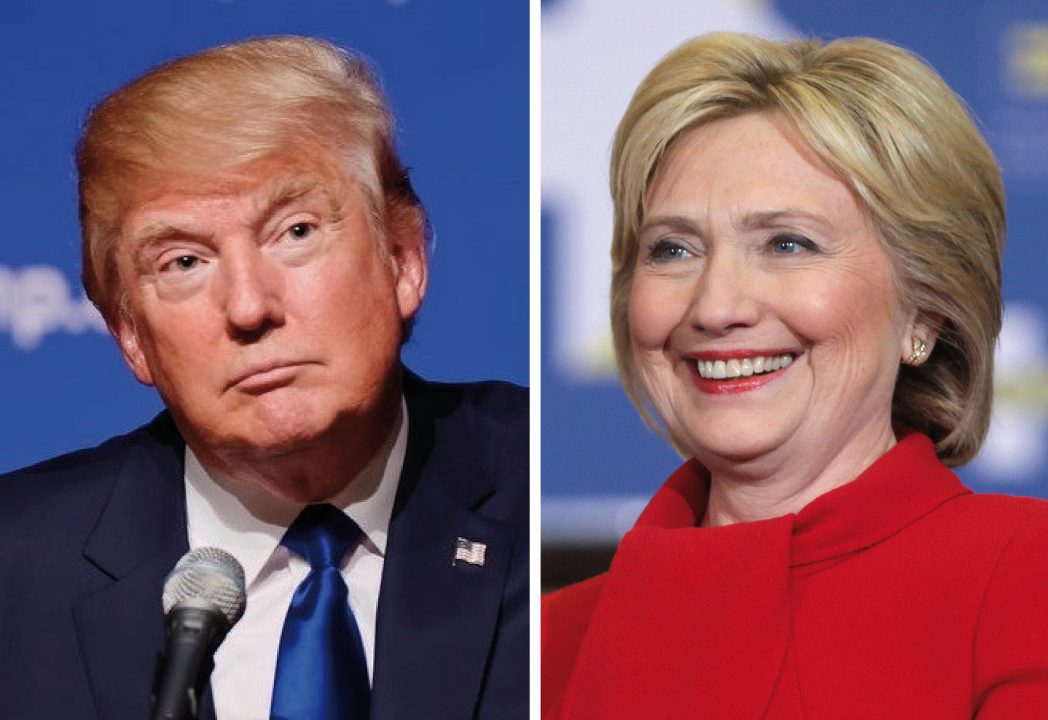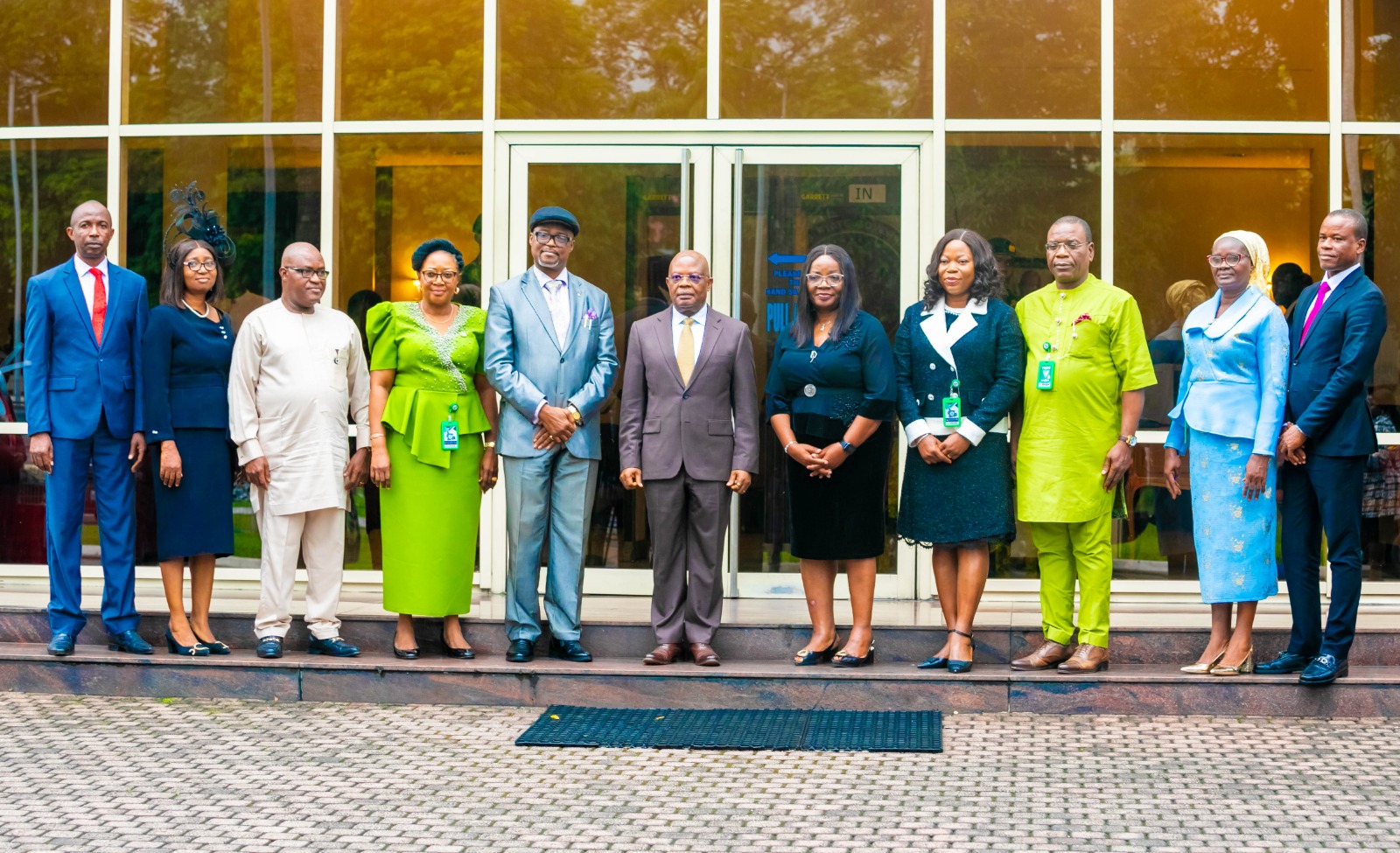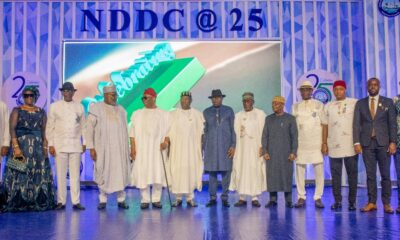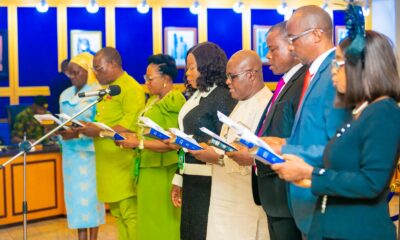Featured
Beyond Political, Spiritual Predictions …Donald Trump To Lead The Free World

Under-estimated from day one, berated and scorned by some, not many saw him coming or even gave him a chance. But bad-mouthing billionaire businessman, Donald Trump is today President-elect of the most powerful nation on earth, the United States of America (USA).
From the primaries, in the Republican party, to the campaigns for the Presidential elections, he was controversial, his political rhetorics, divisive and unspoken word racist. He berated leading lights of his own Grand Od Party (GOP), vilified former US President George Bush over Iraq, mocked frontline republican rivals Michael Rubio, as little Rubio and Ted Cruise, lying ruise.
His campaign style was benile and polarising. He threatened to deport over 11 million undocumented immigrants, restrict Muslim’s influx into the country, build a wall to restrain Mexicans, who he described as rapists and criminals, mocked a physically challenged reporter, denigrated another female journalist and vowed to replace the status in Washington, the seat of US Political Power.
At some point, the choices left for the Republican Party were to replace Trump or distance itself from him. Infact, many top Republicans openly voiced their disapproval of his candidacy and promised to vote for his Democratic Party rival, former Secretary of State, Hillary Clinton.
So when, towards the last three weeks of the campaign, a leud tape went virile, one that saw Trump boasting about his approach to and passion for a class of women, most GOP members thought it was the height of it. Here was a man facing protests among women for describing some of their ilk as pigs, one who described living conditions of African Americans as awful, one who questioned the nationhood of the first Black President, Barack Obama and indeed one caught boasting about his escapades with women, in his own words on tape.
To make matters worse, after Trump had in defence described his vulgar comments as locker-room talk and denying during one of the debates of doing any of those things he boasted about, more than 12 women surfaced with claims that he had sexually harassed them. One even produced a photograph of herself and Trump, all of which, he denied ever meeting, calling them ‘attention seekers’.
Even in the midst of his controversies, his condemnation of nearly all known democratic structures did not abate. Trump said the Amercian press was rigged and so was the political process. Infact, Trump said the political system was rigged against him and threatened not to accept the eventual outcome unless he won.
To describe Trump as a controversial candidate would be an understatement, he was not a conventional politician who spoke guidedly, mindful that what he said would impact on his ambition. Instead, the more foul language, the more electoral missteps, the more polarising campaign, the more accepting Trump became to an equally little-seen voting force.
In poll after poll, Trump trailed Clinton first by double digits and later by a narrow single digit when Clinton’s long dragging E-mail scandal was dramatically re-opened by the Federal Bureau of Investigation (FBI).
Trump’s closest to his opponent in average of all polls was two percentage points and again rose to three, after the FBI finally cleared Clinton. Yet Trump remained on point, insisting amidst jeers that he would win unless the process was rigged against him.
Before the elections proper, the Cable News Network (CNN) pre-poll projections, gave Clinton 268 electoral votes as against trump’s 204, meaning Trump needed to win as many as six states to hit the 270 magic number needed to win the elections, yet Trump soldiered on.
Rather than be discouraged, Trump stretched his campaigns to hardcore traditionally Democratic Party-controlled states like Minessota, Wisconson, and Virginia, all states won by Barack Obama in 2008 and 2012. He also stormed Pennsylvania after making strong showing in Ohio and Iowa.
Trump’s never-say-die disposition to the campaigns forced out the DNC political machine led by President Obama, accompanied by Senator Bonnie Sanders, Vice President Biden, First Lady Michele Obama, Former President Bill Clinton and daughter, Chelsea and indeed all notable Democrats. To stop Trump, the Clinton Campaign revisited Blue states earlier visited by the opponent and even had to go to Colorado, North Carohna and Pennsylvania thrice.
In the end, it was Trump that emerged winner, even after Nigeria’s TV evangelist, Prophet T.B. Joshua had predicted a Clinton victory. It was a victory that was largely unforeseen and even prayed against by many American allies whose relationship with the US he had threatened to review.
Trump had threatened to annul the Iranian deal, force nations enjoying US protection to pay for it and approach all treaties with the eyes of a businessman and above all exit the Paris Climate Change Protocol, to save the US coal industry. Infact, he warned that the days when America played father Christmas and global Policeman without proper reward were over. To make ‘America Great Again’, Trump promised to re-negotiate all existing trade deals and return American jobs, chlipped to China and elsewhere back to Americans.
The question was what went right rather than wrong with Trump?. Paul Ryan, Chairman of the US-Congress, a top Republican who once distanced himself from the Trump campaigns explained: When others were listening to the familiar, Trump heard the voices of many Americans, most didn’t hear – the voices of Americans who wanted a clean-break with the way Washington did its business.
It was a protest by the middle class American, working class crop battling with high health insurance premiums and static wage and Americans tired of the political status quo. Trump heard the voices of those Americans, in the loudest pitch possible, with roaring calls for change, which Democrats and even Republicans did not hear. Not even President Obama, with his high approval rating.
Infact, Obama repeatedly told Americans that Trump lacked the temperament to serve as Commander-in-Chief and with his divisive and exclusionist rhetorics, was unfit to be President. He then advised Americans to reject Trump.
But as it is, Obama must eat his words and has. He must ensure a smooth transition like that he enjoyed from the Bush Presidency and has started and must help heal the wounds of the disappointed and morally wounded and has through public speeches after the results.
Such was the unpredictability of the 2016 American elections. It was a displacement of the status quo, not only in Washington, but indeed the whole of the all powerful American media which predicted a Clinton victory to the angst of Trump.
Nearly all the powerful newspapers endorsed Clinton with only one endorsing Trump. All but one poll chose Clinton as preferred winner but in the end it was Trump and not Clinton that made it to the finishing line first, putting to question the time-tested electoral polling system of the US media.
What went wrong with the US media? Trump supporters insisted the media was biased against their candidate and so was deliberately peddling anti-Trump falsehood, including questionable poll results to sway voters. They repeatedly questioned the authenticity of the polls, saying they were unbelievable but who dared challenge the US media and succeed, not with the first amendment which makes free speech a number one right.
That is why it’s difficult to blame pundits who went along with the American media to predict a Clinton victory must be forgiven. Trump fooled all.
My Agony is that the social media has been making a mince meat of the vocal Prophet T.B. Joshua for predicting a Clinton victory, which never was. Some even questioned the ‘god’ who revealed that false prophecy to him.
Truth is T.B. Joshua predicated that Clinton would win and she did. She won the popular votes. Only, Trump too won. He won the all-important electoral college votes. However, of both winners, T.B. Joshua’s and Trump, it is the latter that is the 45th President-elect of the United States of America. Full-stop.
Soye Wilson Jamabo
Featured
Rivers A Strategic Hub for Nigeria’s Blue Economy -Ibas …Calls For Innovation-Driven Solutions

The Administrator of Rivers State, Vice Admiral (Rtd.) Ibok-Ete Ibas, has emphasized the need for innovation-driven strategies, strategic partnerships, and firm policy implementation to fully harness the vast potential of the blue economy.
Speaking during a courtesy visit by participants of Study Group 7 of the Executive Course 47 from the National Institute for Policy and Strategic Studies (NIPSS) at Government House, Port Harcourt, on Monday, Ibas highlighted the importance of diversifying Nigeria’s economy beyond oil by leveraging maritime resources to create jobs, enhance food security, strengthen climate resilience, and generate sustainable revenue.
The Administrator, according to a statement by his Senior Special Adviser on Media, Hector Igbikiowubo, noted that with coordinated efforts and innovative solutions, the blue economy could serve as a catalyst for inclusive growth, economic stability, and long-term environmental sustainability.
“It is estimated that a fully developed blue economy could generate over $296 million annually for Nigeria, spanning fisheries, shipping and logistics, marine tourism, offshore renewable energy, aquaculture, biotechnology, and coastal infrastructure,” he stated.
“We must transition from extractive practices to regenerative, inclusive, and innovation-driven solutions. This requires political cohesion, intergovernmental collaboration, robust infrastructure, and institutional capacity—all of which must be pursued with urgency and intentionality,” he added.
Ibas urged sub-national governments, particularly coastal states, to domesticate the national blue economy framework and develop tailored strategies that reflect their comparative advantages.
He stressed that such efforts must be guided by disciplined planning, regulation, and investment to maximize the sector’s potential.
Highlighting Rivers State’s pivotal role, the Administrator outlined its strategic advantages as follows:
•Nearly 30% of Nigeria’s total coastline (approximately 853km)
•Over 40% of Nigeria’s crude oil and gas output
•More than 33% of the country’s GDP and foreign exchange earnings
•416 of Nigeria’s 1,201 oil wells, many located in marine environments
•Two of Nigeria’s largest seaports, two oil refineries, and the Nigerian Liquefied Natural Gas (NLNG) terminal in Bonny Island—one of Africa’s most advanced gas facilities
Despite these opportunities, Ibas acknowledged challenges such as pollution, coastal erosion, illegal oil refining, unregulated fishing, inadequate infrastructure, and maritime insecurity.
He reaffirmed his administration’s commitment to institutional reforms, coastal zone management, and inter-agency collaboration to build a governance structure that supports a sustainable blue economy.
“Sustainability must be embedded in our development models from the outset, not as an afterthought. We are actively exploring partnerships in maritime education, aquaculture development, port modernization, and renewable ocean energy. We welcome knowledge-sharing engagements like this to refine our strategies and enhance implementation,” he said.
He urged the NIPSS delegation to ensure their findings translate into actionable recommendations that address the sector’s challenges.
Leader of the delegation, Vice Admiral A.A. Mustapha, explained that the visit aligns with their strategic institutional tour mandate on the 2025 theme: “Blue Economy and Sustainable Development in Nigeria: Issues, Challenges, and Opportunities.”
The group is engaging stakeholders to deepen understanding of policy efforts and institutional roles in advancing sustainable development through the blue economy.
Featured
INEC To Unveil New Party Registration Portal As Applications Hit 129

The Independent National Electoral Commission (INEC) has announced that it has now received a total of 129 applications from associations seeking registration as political parties.
The update was provided during the commission’s regular weekly meeting held in Abuja, yesterday.
According to a statement signed by the National Commissioner and Chairman of the Information and Voter Education Committee, Sam Olumekun, seven new applications were submitted within the past week, adding to the previous number.
“At its regular weekly meeting held today, Thursday 10th July 2025, the commission received a further update on additional requests from associations seeking registration as political parties.
“Since last week, seven more applications have been received, bringing the total number so far to 129. All the requests are being processed,” the commission stated.
The commission revealed the introduction of a new digital platform for political party registration. The platform is part of the Party Financial Reporting and Auditing System and aims to streamline the registration process.
Olumekun disclosed that final testing of the portal would be completed within the next week.
“INEC also plans to release comprehensive guidelines to help associations file their applications using the new system.
“Unlike the manual method used in previous registration, the Commission is introducing a political party registration portal, which is a module in our Party Financial Reporting and Auditing System.
“This will make the process faster and seamless. In the next week, the commission will conclude the final testing of the portal before deployment.
“Thereafter, the next step for associations that meet the requirements to proceed to the application stage will be announced. The commission will also issue guidelines to facilitate the filing of applications using the PFRAS,” the statement added.
In the meantime, the list of new associations that have submitted applications has been made available to the public on INEC’s website and other official platforms.
Featured
Tinubu Signs Four Tax Reform Bills Into Law …Says Nigeria Open For Business

President Bola Tinubu yesterday signed into law four tax reform bills aimed at transforming Nigeria’s fiscal and revenue framework.
The four bills include: the Nigeria Tax Bill, the Nigeria Tax Administration Bill, the Nigeria Revenue Service (Establishment) Bill, and the Joint Revenue Board (Establishment) Bill.
They were passed by the National Assembly after months of consultations with various interest groups and stakeholders.
The ceremony took place at the Presidential Villa, yesterday.
The ceremony was witnessed by the leadership of the National Assembly and some legislators, governors, ministers, and aides of the President.
The presidency had earlier stated that the laws would transform tax administration in the country, increase revenue generation, improve the business environment, and give a boost to domestic and foreign investments.
“When the new tax laws become operational, they are expected to significantly transform tax administration in the country, leading to increased revenue generation, improved business environment, and a boost in domestic and foreign investments,” Special Adviser to the President on Media, Bayo Onanuga said on Wednesday.
Before the signing of the four bills, President Tinubu had earlier yesterday, said the tax reform bills will reset Nigeria’s economic trajectory and simplify its complex fiscal landscape.
Announcing the development via his official X handle, yesterday, the President declared, “In a few hours, I will sign four landmark tax reform bills into law, ushering in a bold new era of economic governance in our country.”
Tinubu made a call to investors and citizens alike, saying, “Let the world know that Nigeria is open for business, and this time, everyone has a fair shot.”
He described the bills as not just technical adjustments but a direct intervention to ease burdens on struggling Nigerians.
“These reforms go beyond streamlining tax codes. They deliver the first major, pro-people tax cuts in a generation, targeted relief for low-income earners, small businesses, and families working hard to make ends meet,” Tinubu wrote.
According to the President, “They will unify our fragmented tax system, eliminate wasteful duplications, cut red tape, restore investor confidence, and entrench transparency and coordination at every level.”
He added that the long-standing burden of Nigeria’s tax structure had unfairly weighed down the vulnerable while enabling inefficiency.
The tax reforms, first introduced in October 2024, were part of Tinubu’s post-subsidy-removal recovery plan, aimed at expanding revenue without stifling productivity.
However, the bills faced turbulence at the National Assembly and amongst some state governors who rejected its passing in 2024.
At the NASS, the bills sparked heated debate, particularly around the revenue-sharing structure, which governors from the North opposed.
They warned that a shift toward derivation-based allocations, especially with VAT, could tilt fiscal balance in favour of southern states with stronger consumption bases.
After prolonged dialogue, the VAT rate remained at 7.5 per cent, and a new exemption was introduced to shield minimum wage earners from personal income tax.
By May 2025, the National Assembly passed the harmonised versions with broad support, driven in part by pressure from economic stakeholders and international observers who welcomed the clarity and efficiency the reforms promised.
In his tweet, Tinubu stressed that this is just the beginning of Nigeria’s tax evolution.
“We are laying the foundation for a tax regime that is fair, transparent, and fit for a modern, ambitious Nigeria.
“A tax regime that rewards enterprise, protects the vulnerable, and mobilises revenue without punishing productivity,” he stated.
He further acknowledged the contributions of the Presidential Fiscal Policy and Tax Reform Committee, the National Assembly, and Nigeria’s subnational governments.
The President added, “We are not just signing tax bills but rewriting the social contract.
“We are not there yet, but we are firmly on the road.”
-
News17 hours ago
NOA Set To Unveil National Values Charter — D-G
-
Politics14 hours ago
2027: Group Vows To Prevail On Diri To Dump PDP For APC
-

 Features17 hours ago
Features17 hours ago25 Years After: NDDC Celebrates Milestones Of Impactful Development
-
Business19 hours ago
NCDMB Promises Oil Industry Synergy With Safety Boots Firm
-

 News15 hours ago
News15 hours agoRivers Police Arrest Notorious Cultist, Recover Sophisticated Ammunition
-
Niger Delta17 hours ago
Adopt African System Against Crime, Don Urges Security Agencies
-

 News13 hours ago
News13 hours agoIbas Inaugurates RSIEC, Service Commissions, Healthcare Board In Rivers …Charges Appointees To Embrace Principles Of Service
-
Rivers17 hours ago
Monarch Cautions Youths Against Illicit Drug Consumption

